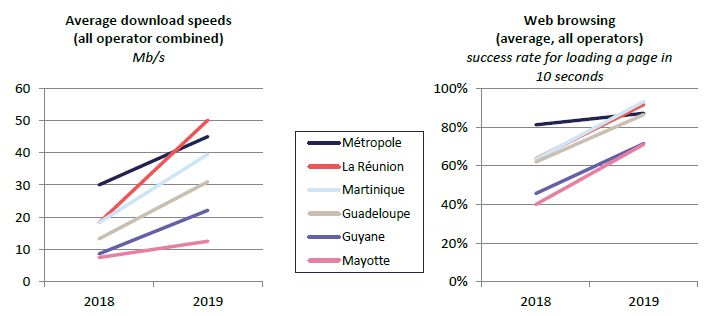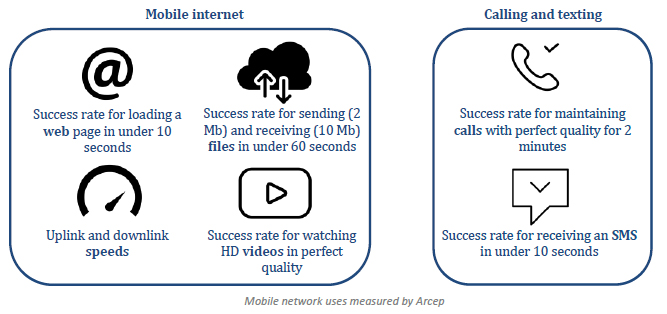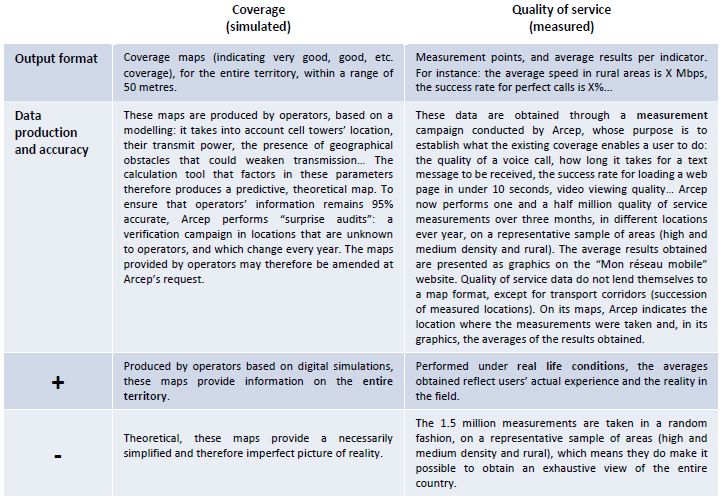Today Arcep is publishing the coverage maps and quality of service scorecard for mobile operators in the French overseas departments on its monreseaumobile.fr website. This publication allows consumers in the overseas markets to compare operators’ performance, and for public policymakers to obtain an diagnosis on the state of mobile connectivity in their region. All of the data are available as open data files.
Results show a clear improvement over last year: a testament to 4G rollout efforts in the overseas departments
The quality of mobile data services has improved substantially since 2018: average connection speeds have doubled virtually across the board, and the quality of Web browsing has improved by an average 50%. These performances align, and in some cases surpass, those found in Metropolitan France.
- In Guadeloupe and Martinique: Orange leads the way on most indicators, and stands out for a very significant increase in connection speeds. SFR is a close second, and equal on several indicators, such as successful call rates in Guadeloupe, and leads Orange in successful SMS delivery rates in Martinique where the operator has made real strides. Digicel has made considerable rollout efforts since 2018 and is nearing all other operators’ performance levels, particularly in the area of Web browsing and, in Guadeloupe, has achieved perfect call quality results comparable to Orange.
- In Guiana: Orange tops the rankings for the vast majority of indicators. SFR ranks second in data services and has comparable upstream speeds and successful file transfer rates. Digicel’s performance is comparable to SFR’s on several data indicators (perfect quality file transmission and reception) and has made significant progress in voice call services – ranking number one in perfect call quality.
Arcep noted several locations in Guiana where operators have deployed 4G towers but where 4G performances are occasionally mediocre, with speeds comparable to those enabled by 3G. This is particularly true in northwest Guiana (where average speeds are acceptable but occasionally very slow) and especially so in the towns of Apatou, Grand Santi, Papaïchton and Maripasoula.
- Mayotte: SFR continues to lead on most indicators, such as call quality, web browsing and streaming. Orange has made real progress in the quality of mobile data services, and leads SFR on speeds. Maore Mobile has been providing lower quality data services since mid-2019 due to its still limited coverage. Only is close to SFR on call quality but ranks last on data services, and had not yet deployed 4G when the campaign took place.
- In Reunion: Orange and SFR are close, with Orange leading on speeds and video service quality – for which average scores are better than the average in Metropolitan France. Zeop, which entered the market in April 2019, is providing a quality of service very close to that of Orange and SFR. Free ranks last on most indicators.
Exceptionally, file transfer indicators (and speed in particular) for Free are not being published this year: the measurements taken for this operator during the audit produced anomalous results, and are not representative of the user experience.
- In Saint-Barthélemy and Saint-Martin: despite a difficult situation, two years after hurricane Irma the quality of calling, texting and data services is satisfactory. Orange leads on the vast majority of indicators, particularly for data services and on transport corridors. Dauphin Telecom ranks number one for perfect call quality, followed closely by Digicel in Saint Barthélemy and by UTS Caraïbe in Saint-Martin.
There can be significant disparities in quality between operators and between the regions: Arcep invites everyone to compare them on monreseaumobile.fr, and to view the findings in accordance with their needs and their area.
New additions to the 2019 measurement campaign: expanded scope of the measurements and the range of tests performed.
Arcep’s measurement campaign in the overseas departments and territories, which was conducted in summer 2019, performed two complementary tasks:
- Measuring the quality of mobile services, in the field, from May to September 2019 to test quality of service (call maintained for two minutes, quality of the voice call, loading a web page in under 10 seconds…). 227,000 measurements were thus taken, covering an expanse of 52,000 km, including 1,500 km travelled by helicopter, in virtually every municipality in France’s overseas territories.
- Verifying operators’ coverage maps: produced based on digital simulations, these maps pertain to calling, texting and mobile internet services. Arcep verified that the maps supplied by operators provided a high degree of accuracy in each of the territories, before being published.
Measurement campaigns had been conducted in Guadeloupe, Guiana, Martinique, Mayotte and Reunion in 2018. This year, Arcep included the islands of Saint-Barthélemy and Saint-Martin. Tests were also performed in more isolated or hard to reach areas that had not been measured last year, including Terre de Bas in Guadeloupe, and the towns of Maripasoula, Papaichton and Grand-Santi in western Guiana.
In addition, Arcep expanded the range of tests that were performed, to more accurately reflect users’ actual experience. New indicators were added, for measuring call quality, online video viewing, file transfers… As in Metropolitan France, tests to measure call quality were automated[1].
[1] This change in the testing protocol for voice call quality was detailed when publishing the findings of the QoS survey conducted in Metropolitan France in 2019, which can be found here: https://www.arcep.fr/actualites/les-communiques-de-presse/detail/n/qualite-des-services-mobiles-2.html



